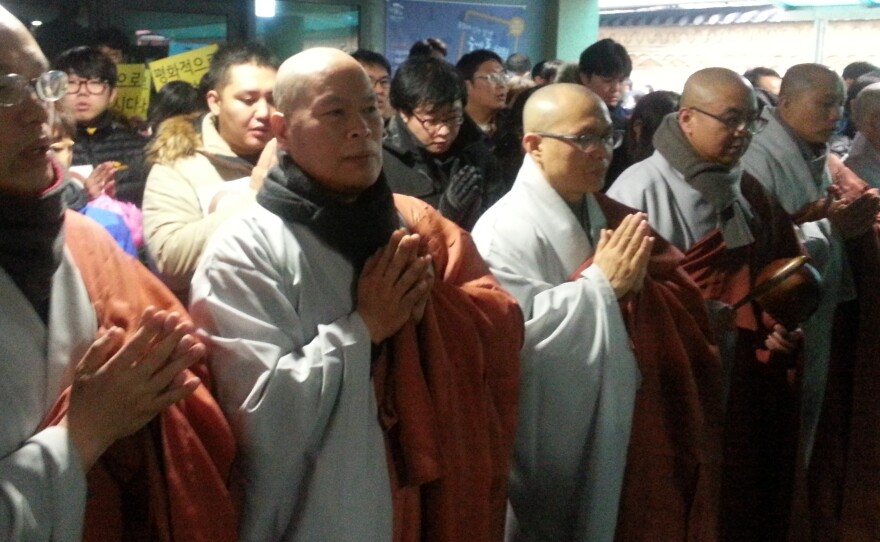
Buddhist monks are now in the role of negotiators to try to resolve a standoff between police and a leading labor organizer in South Korea.
For weeks, Buddhist monks at Seoul's top temple have helped provide refuge for labor union organizer Han Sang-gyun. He's holed up inside the Jogye temple to avoid arrest, as police seek him on charges of inciting violence during a 60,000-person anti-government rally last month. The police had given Han a deadline of 4 p.m. Wednesday (2 a.m. EST) to turn himself in, and if he didn't comply, the police chief said his men would raid the temple by force.
As the deadline neared, hundreds of Korean conscripted officers surrounded the historic temple, normally a place of peace. Labor union supporters and onlookers crowded outside the swarm of officers, while monks lined up to pray and chat at the entrance to labor leader Han's temporary quarters. The head monk of the Jogye order appealed for calm and an extension of the deadline. When time came for the raid, the national police agency decided to postpone, at least for now.
"If the police raid the temple, it ... will be tantamount to a state clampdown on the Jogye Order and on the whole Buddhist movement in South Korea," read a statement from the order released earlier this week. The Jogye Order is South Korea's largest Buddhist sect.
This is the latest flash point between the conservative South Korean government and progressive groups and causes.
The main labor group, led by Han Sang-gyun — the man holed up in the temple — is considered the loudest and most militant, but it's not the only organization speaking out against President Park Geun-hye's government for a long list of grievances.
The grievances include but are not limited to: a labor reform proposal that would make it easier for corporations to fire workers; the government replacing privately-published history textbooks with a state-issued text; a widening gap between rich and poor; too few jobs for young people; state overreach on national security matters; and what demonstrators say is an overall shift toward more authoritarian policies that are undermining civil society.
"Things that have never happened since the military dictatorships seized power through coups are happening now in South Korea," said Park Jum-gyu, a spokesperson for the labor activist group "Movement for Janggrae."
South Korea's democracy was born only in 1987, following decades of dictatorship, perhaps most notably under General Park Chung-hee. Park came to power in 1961 in a coup and as South Korea's leader until 1979, he suppressed — sometimes violently — dissidents and workers who tried to organize for improved conditions and better wages.
General Park is the father of the current South Korean president, Park Geun-hye. When the current President Park sought to rewrite history books and supported the use of tear gas and water cannons on thousands of demonstrators in Seoul's streets, her opponents began to draw more links between her style and her authoritarian father's.
In the West, The New York Times ran an editorial criticizing Park's recent moves, writing, "The biggest risk to South Korea's reputation abroad ... is not economic but political, chiefly Ms. Park's heavy-handed attempts to rewrite history and quash dissent."
Given the dramatic run-up to this still-simmering standoff outside religious grounds, how it is ultimately resolved is being watched closely.
Haeryun Kang contributed to this story.
Copyright 2015 NPR. To see more, visit http://www.npr.org/.






